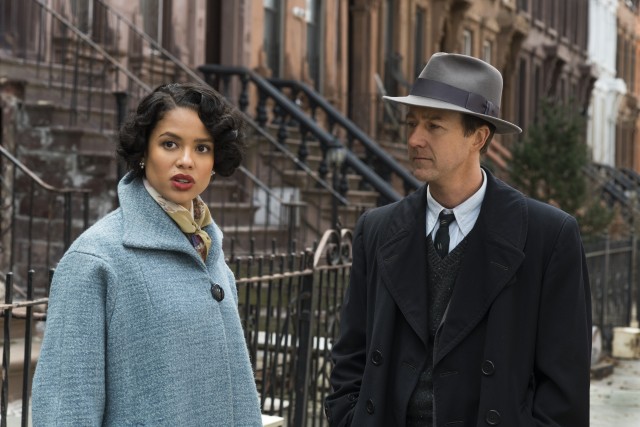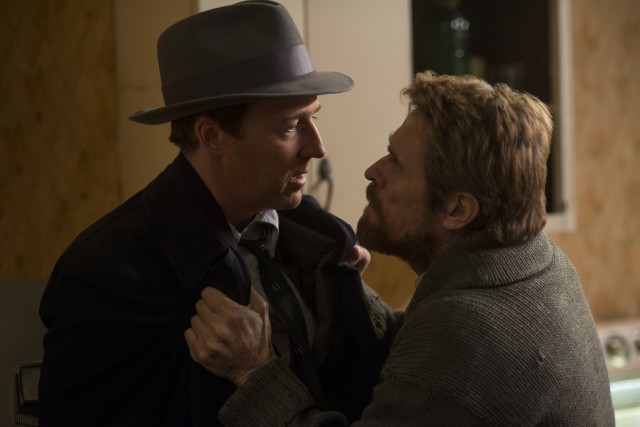Motherless Brooklyn Movie Review
 |
Motherless Brooklyn
Theatrical Release: November 1, 2019 / Running Time: 144 Minutes / Rating: R Director: Edward Norton / Writers: Edward Norton (screenplay), Jonathan Lethem (novel) Cast: Edward Norton (Lionel Essrog), Gugu Mbatha-Raw (Laura Rose), Alec Baldwin (Moses Randolph), Willem Dafoe (Paul Randolph), Bruce Willis (Frank Minna), Ethan Suplee (Gilbert Coney), Cherry Jones (Gabby Horowitz), Bobby Cannavale (Tony Vermonte), Dallas Roberts (Danny Fantl), Josh Pais (William Lieberman), Radu Spinghel (Giant Man), Fisher Stevens (Lou), Peter Lewis (Mayor), Robert Ray Widsom (Billy Rose), Michael Kenneth Williams (Trumpet Man) |
Edward Norton, an actor well-known for applying creative input to his films, picks up only his second directing credit, and first in nearly twenty years, on Motherless Brooklyn. It's an evident passion project which Norton has also adapted Lionel Essrog is a private eye afflicted with a form of Tourette's though he doesn't label it that or receive any kind of prescribed medical treatment for it. He does, however, repeatedly describe to both us and other characters he encounters the condition that manifests in little comical rhymes and his go-to exclamation of "If." You've heard of the Rule of Three. Here, Norton subscribes to the rule of Three Hundred, the approximate number of times he exhibits and apologizes for his affliction.
The portrayal of Tourette's often for laughs is the biggest miscalculation of Norton's ambitious and well-intentioned mystery, which is set in 1950s New York. In the opening scene, Lionel and a colleague (Ethan Suplee) are supposed to provide back-up for their boss and Lionel's father figure, Frank Minna (Bruce Willis). Instead, Frank winds up dead and Lionel decides he has to put together the clues to figure out who killed his mentor and why.
Lionel's trail leads him to Laura Rose (Gugu Mbatha-Raw), an attractive African-American woman whose father owns a popular jazz club in Harlem. Laura has been advocating against the systemic discrimination she has observed in the City's planning. Lionel poses as a reporter sympathetic to the cause and willing to shine a light on it.
Motherless juggles a lot in its epic, nearly 2½-hour runtime. There is the divisive parks commissioner Moses Randolph (Alec Baldwin) who wields the great power the film's opening quote seems to allude to. There is the scarred Trumpet Man (Michael K. Williams) whose music Lionel can't help but scat along to. There is Randolph's brother (Willem Dafoe), a disheveled genius hiding his relation to the commissioner.
Norton has assembled a pretty stellar cast and as a result accomplished actors like Willis, Dafoe, Leslie Mann, and Bobby Cannavale have to settle for fringe presences, with at most a handful of scenes each. The production design is also commendable, reflecting the generous $26 million estimated budget Warner Bros. has given Norton. It's a handsome film on a technical level with cinematographer Dick Pope (the infamously-mispronounced two-time Oscar nominee for Mr. Turner and Norton's The Illusionist) showing off with a number of ostentatious shots.
Despite its pleasing production values and flourishes, Motherless never really soars narratively. It runs much too long with too many repetitive bits. Norton's screenplay tries very hard to tie all these threads together including a contemporary-minded examination of institutional racism. Even with the fine performances of the cast, it's too tall a task to pull off. Affleck's gangster film had a much bigger budget and understandably so; he was coming off of his Oscar winner Argo and, as leading man, Gone Girl and The Accountant. Norton hasn't directed anything since the 2000 romcom Keeping the Faith, starring Ben Stiller as a rabbi, Norton as a priest/his best friend, and Jenna Elfman as the object of their love triangle-forming affections. And his track record as a leading man has always been spotty, dating back to the box office disappointments of Rounders and Fight Club. Without the critical raves anticipated by the subject matter and timing, Motherless Brooklyn seems destined to disappoint and contribute to the mid-sized movie's concerning trend towards obsolescence in Hollywood.
|
Related Reviews:
DVDizzy.com | DVD and Blu-ray Reviews | New and Upcoming DVD & Blu-ray Schedule | Upcoming Cover Art | Search This Site
DVDizzy.com Top Stories:
Now in Theaters: Joker • Terminator: Dark Fate • Gemini Man • Zombieland: Double Tap • Judy
Edward Norton: 25th Hour • Birdman • Primal Fear • Stone
Live by Night
Text copyright 2019 DVDizzy.com. Images copyright 2019 Warner Bros. Pictures, Class 5 Films, and MGM Studios.
Unauthorized reproduction prohibited.

